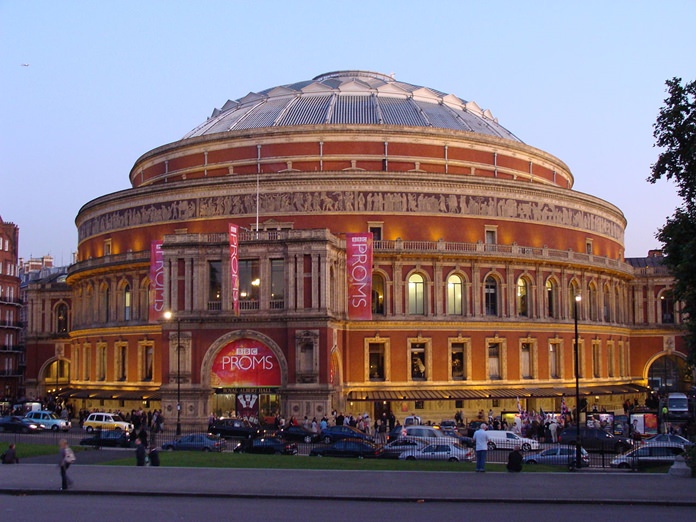
Friday the Thirteenth may have sinister overtones for some people, but this month it marks the start of what’s been described as “the world’s greatest classical music musical festival.” I refer of course to the Proms, an eight-week summer feast of orchestral concerts held mainly in London’s Royal Albert Hall. With over ninety orchestral concerts the Proms will draw some of the world’s greatest classical musicians to the capital. The word “promenade” comes from the French verb promener, meaning “to walk”. It was used to describe the open-air concerts that were given in London’s parks and pleasure gardens since the middle of the 18th century.
The present day Proms began 123 years ago in 1895, inaugurated by the impresario Robert Newman and the conductor Henry Wood. The concerts were held at Queen’s Hall, a massive Victorian building in Central London with room for about 2,500 people. In 1927 the British Broadcasting Corporation took over the concerts and has continued to the present day. Queen’s Hall was destroyed during a wartime air raid in 1941 and the Proms moved to the Royal Albert Hall which has a capacity for over five thousand people.
The season culminates with the popular concert known as The Last Night of the Proms famous for its British patriotic music accompanied by flag-waving and audience participation. All this shenanigans is in total contrast the other concerts which are much more conventional.
The Promenaders are those who stand throughout the concert either in the large area directly in front of the stage or in the gallery at the top of the hall which, if you don’t suffer from vertigo, can offer a bird’s-eye view of the stage. There are well over a thousand standing places available for each concert and tickets are a mere Bt 500; half that if you are under eighteen. The hall also has comfortable seating for those who are prepared to pay extra.
Last year 300,000 people attended Proms, though millions more heard the concerts on radio and television. All the concerts are broadcast live on UK national radio or streamed on the Internet and many will be televised on BBC Four. So this week, let’s hear two works that will be performed on the opening night of Friday the Thirteenth and recorded at previous Prom concerts.
The evocative title is from a poem by Walt Whitman, whose writing influenced many young artists and musicians during the late nineteenth century. Vaughan Williams was fascinated by Whitman’s poetry and the collection of poems Leaves of Grass was a constant companion. The Sea Symphony of 1910, written for choir and orchestra uses Whitman’s poetry throughout.
Toward the Unknown Region was first performed at the Leeds Festival in October 1907 with the composer conducting. It was his first major choral work, though it’s rarely performed today. This is a shame for it’s a wonderful setting of the poem with superb choral writing, brilliant orchestration and soaring melodies. This splendid performance, recorded at the Proms in 2013 is as fresh and captivating as ever, with excellent audio quality too.
Scored for a huge orchestra, this seven-movement orchestral suite may not have been written if Gustav Holst hadn’t gone on holiday to Mallorca in the spring of 1913. During the visit, his friend Clifford Bax (the brother of composer Arnold Bax) introduced Holst to astrology and this gave him the idea for this work, which was finally completed in 1918. The concept is astrological rather than astronomical and the music portrays the supposed emotions and influences of the planets on the human psyche.
The first movement Mars, the Bringer of War has five beats to the bar and an ominous insistent rhythmic pattern dominates the entire movement. At the opening, the strings play this rhythm col legno which involves hitting the string with the wood of the bow, producing an eerie percussive sound.
The fourth movement Jupiter, the Bringer of Jollity includes a memorable tune that the composer later adapted as a hymn. The last movement, Neptune, the Mystic was one of the first pieces of orchestral music to have a fade-out ending. It uses a female chorus which in this performance remains hidden up in the gallery.
Holst didn’t write a movement for Pluto because the planet wasn’t discovered until 1930. This however, hasn’t stopped other composers from trying. In 2000, the Hallé Orchestra commissioned the English composer Colin Matthews, an authority on Holst, to write a new eighth movement, which he called Pluto, the Renewer and it’s included in this performance.
 |
 |
 |




